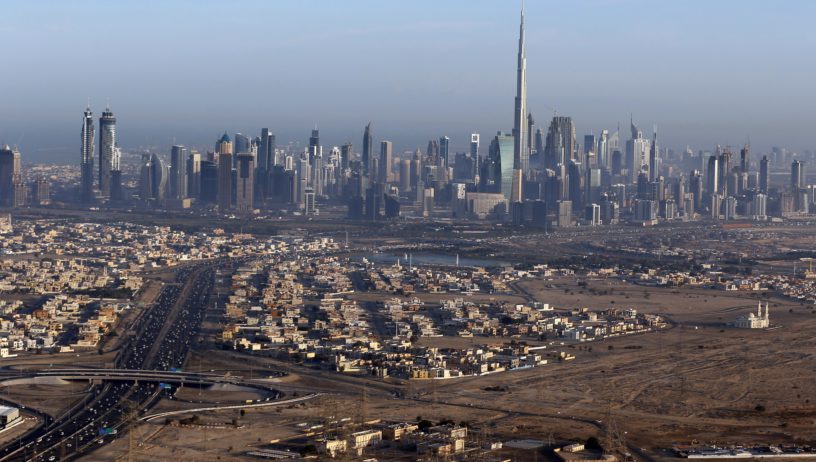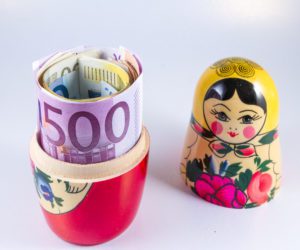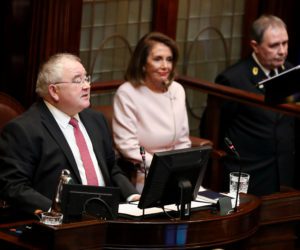By MAGGIE MICHAEL
ON A pleasure boat cruising Gulf waters near Dubai’s glittering skyline, a Nigerian woman in a white dress and gold jewelry nodded and swayed as a gathering sang “Happy Birthday” to her.
Videos of Christy Gold’s 45th birthday party were posted in May last year on an Instagram account that showcases her glamorous lifestyle, months after Gold fled Nigeria, where she was facing sex trafficking charges.
Gold – whose name appears in court records as Christiana Jacob Uadiale – was a ringleader in a criminal network that lured African women to Dubai and forced them into prostitution in brothels, backstreets, bars, hotels and dance clubs,
according to six Nigerian government anti-trafficking officials, a British human rights activist who has tracked her operation and five women who say they were trafficked and exploited by her.
Three of the women said in interviews that Gold told them that if they didn’t do as they were told, they’d be killed and dumped in the desert. Those who didn’t make enough money for her were taken to a room in an apartment in Dubai, where Gold’s
brother starved them, flogged them and shoved hot chili paste into their vaginas, according to three anti-trafficking officials and five women who provided detailed accounts in interviews and court statements.
“They beat the hell out of me,” one of the women said. “The suffering was too much.”
In a statement to the court after she was charged, Gold denied that she and her brother were sex traffickers. “I am not involved in human trafficking and I do not have any girls in Dubai working for me as a prostitute,” she said.
Gold remains a fugitive from justice – part of what anti-trafficking activists and officials say is a thriving underground of suspected Nigerian sex traffickers who have taken refuge in the United Arab Emirates, a Gulf nation known for its
wealth, futuristic skyscrapers and what rights groups say is a poor record on protecting foreign workers and basic freedoms.
The UAE is a major destination for sex trafficking, where African women are forced into prostitution by illicit networks operating within the country, an investigation by the International Consortium of Investigative Journalists and Reuters has found.
Emirati authorities do little to protect these women, according to anti-trafficking activists, Nigerian authorities and interviews with trafficked women.
This story is based on interviews with 25 African women, mostly from Nigeria, who described being lured to the UAE by Gold or other alleged traffickers, as well as dozens of interviews with humanitarian workers, investigators, Nigerian
government officials and others with knowledge of sex trafficking in the Emirates. Their accounts are corroborated by court records and case files from Nigeria’s anti-human trafficking agency.
Human traffickers keep African women in sexual slavery by playing on their financial desperation and creating webs of manipulation and coercion, the reporting shows. They subject them to threats and violence. They ensnare them in crushing
debts, often totaling $10,000 to $15,000 – huge sums for women from poor families. And, in many cases, they exploit traditional African spiritual beliefs to make victims believe that they have no choice but to do what the traffickers tell them.
This article is part of a reporting collaboration led by ICIJ, Trafficking Inc., which is examining sex trafficking and labor trafficking in many parts of the globe. ICIJ’s media partners on the project include Reuters, NBC News, Arab Reporters for Investigative Journalism and other news outlets in multiple countries.
Gold did not respond to questions for this story. In her statement to the court in Nigeria, Gold said she had helped Nigerian women and men move to the UAE by subletting space to them in an apartment she owned in Dubai.
“I even go as far as advising them like a mother so they too can make it in Dubai,” she said. But she told the court, “I cannot tell what these people did for a living in Dubai.”
In a written reply supplied by the Dubai government’s media affairs office, the emirate’s police agency said claims that Gold had engaged in the sex trafficking of African women in Dubai are “false and have absolutely no basis in fact.” The
statement said Gold had “entered and exited Dubai legally and was not implicated in any illegal activities.”
The UAE Ministry of Foreign Affairs said any suggestion the UAE “tolerates human trafficking or that it has little regard to the victims of this heinous crime is utterly false.” Such allegations, the ministry said in response to questions, were
“baseless and without foundation.”
The ministry said the UAE’s laws on sex trafficking carry heavy fines and prison sentences. A report the ministry shared said the UAE had referred 20 “human trafficking cases” to the courts in 2021, most for “sexual exploitation.”
The UAE has been involved in international police operations against trafficking networks, the ministry said.
Human rights activists and Nigerian authorities say the UAE doesn’t live up to its anti-trafficking commitments.
Fatima Waziri-Azi, director general of Nigeria’s National Agency for the Prohibition of Trafficking in Persons, said there has been “no cooperation” when NAPTIP has reached out to Emirati authorities for help hunting down traffickers working out of the UAE.
Angus Thomas, a British activist who founded an anti-trafficking education organization based in Ghana, said UAE authorities, including the police, were uncooperative when he urged them to help African women get away from Gold and her associates.
“I wrote, I phoned, I emailed, asking them to help me get the girls, sending addresses of apartments,” he said. “And I heard nothing.”
IN PLAIN SIGHT
Sex trafficking is one form of human trafficking, which is
generally defined as using force, fraud or coercion to induce
someone to provide a service.
Most of the 25 women interviewed for this story said they
were promised other types of work but were driven into
prostitution. Others said they chose to do sex work but were
trapped in situations in which they were abused, their earnings
were stolen and they were unable to get away.
The UAE made sex trafficking a crime in 2006 and has
established an interagency anti-trafficking panel and opened
shelters for survivors. The U.S. State Department said in 2022
that the UAE has made “significant efforts” to combat human
trafficking but still falls short in key areas – including
failing to “consistently screen vulnerable populations for
trafficking indicators, which may have penalized some victims
for unlawful acts traffickers compelled them to commit, such as
immigration or ‘prostitution’ violations.”
The UAE follows Islamic law, yet prostitution and sex
trafficking are open secrets. Business cards with photos and
WhatsApp numbers for brothels disguised as massage parlors
litter many areas of Dubai. Spas, dance clubs and bars are
filled with sex workers.
A hierarchy based on skin tone plays an important role in
the UAE’s sex industry, according to interviews with trafficked
women and visits to spots where prostitutes congregate in the
UAE. Lighter-skinned women from Europe are generally trafficked
into higher-end venues serving wealthier customers.
Darker-skinned women are often steered to alleys and street
corners, providing sex to low-income migrant workers from South
Asia and Africa.
One Nigerian woman described being taken by a trafficker to
an open-air brothel in the desert between Dubai and another
emirate, Abu Dhabi. She said she and other women would take off
their clothes and spread them on the ground, and men would come
to have sex with them from 5 p.m. to 11 p.m.
A Nigerian mother in her 20s said a trafficker led her and
two other women to a parking lot in Ajman, one of the emirates
that make up the UAE, and forced them to have sex with male
clients amid vehicles that were being painted and repaired. At
the end of the night, she said, the traffickers took all the
money, leaving them with nothing to buy food.
After she broke free of the trafficker, the woman said, she
slept in the streets and begged for food. She nearly lost her
mind, she said, before a nurse from Nigeria rescued her and
helped her get home.
The UAE’s sex industry is shaped by the country’s
distinctive demography and economy.
Nearly 90% of its population comes from somewhere else –
mostly foreign workers employed in construction, hospitality and
other industries. Most of them are men and they arrive alone. As
a result, 69% of the UAE’s population is male. The government
deals with these demographic realities by deploying extensive
surveillance in the UAE – and by allowing a bustling sex trade
as a way of pacifying male workers, according to two former
diplomats who were based in the UAE and monitored sex
trafficking.
GOLD AND MERCY
On New Year’s Eve 2019, Thomas, a photographer and
anti-trafficking activist, had a one-day layover in the UAE
before heading home to London. He was going into a supermarket
in Dubai when a 19-year-old Nigerian woman approached him and
offered him sex.
He declined, but asked her if she wanted to return to her
home country.
She told him, Thomas said, that she and 22 other women were
under the control of a trafficker named Christy Gold. Back in
London, he sent her money to rent a safe place to stay and then
arranged a flight home to Nigeria.
Thomas said he began trying to rescue other women trapped in
Dubai. He started a campaign called Send Them Home, raising
money to cover victims’ escape and travel costs. Over several
months, Thomas said, he helped rescue eight other women who said
they’d been held against their will by Gold or other traffickers
operating in the UAE. Thomas’ account was confirmed by Nigerian
anti-trafficking officials and women who Thomas helped escape
from traffickers.
He also shared information that he had gathered about Gold
with Nigeria’s anti-trafficking agency NAPTIP, which can arrest
and prosecute alleged traffickers. His efforts included tracking
Gold’s Instagram account, where she displays hundreds of online
posts featuring lion-shaped gold pendants and other jewelry she
sells through a gold trading business she runs from Dubai.
In a May 2022 email to Waziri-Azi, the Nigerian
anti-trafficking agency’s director, Thomas wrote that Gold was
“flaunting her wealth built on the backs” of young women “she
trafficks to Dubai.”
Little is known about Gold’s background. In her written
statement to the Nigerian court, Gold said that she traveled to
Dubai in 2009 and after that began shuttling back and forth,
buying gold, shoes and handbags in the UAE and selling them in
Nigeria.
According to victim statements to the court and interviews,
Gold and her associates targeted Nigerian women who were
desperate for work and new lives, promising them jobs in hair
salons, restaurants and other retail businesses in Dubai. Gold’s
associates helped them obtain Nigerian passports and tourist
visas to travel to the UAE.
Descriptions of her operations come from five women who said
they’d been trafficked by Gold. Three gave detailed interviews.
Two of the three women interviewed for this story, along with
two other women, have submitted witness statements in Gold’s
criminal case.
Each of the three women interviewed for this article said
she was trafficked after being approached by a recruiter, Mercy
Ewere Owuzo, who worked with Gold.
One said she was working in a shop in Nigeria’s largest
city, Lagos, in July 2019 when Owuzo told her that she could
make much more money as a salesperson in a store in Dubai.
“I didn’t ask any questions because she told me she is
trying to help young women and I thought, ‘She is a kind
person,’” the woman, 25, recalled.
She said Owuzo paid for her passport, plane ticket and UAE
tourist visa.
After arriving in Dubai, she said, she talked by phone to
Owuzo, who told her there was no job for her in a store.
Instead, she would be going to clubs, restaurants and hotels
to sell her body. It was the only way, she said she was told, to
pay down the $12,000 debt that she owed Gold for bringing her to
the UAE.
The three women said Gold also controlled them by
confiscating their passports. Then, they said, she created fake
passports that appeared authentic enough to get them through
routine police stops or past front desks at hotels – but not
enough to get them out of the country.
It’s not clear from witness accounts and court documents
whether Gold was the topmost leader of the alleged trafficking
network. The three women interviewed for this story said she
exercised a substantial level of authority and was deeply
engaged in the network’s operations – personally threatening,
for example, to leave their corpses in the Arabian Desert if
they didn’t comply with her demands.
“Every time we don’t bring money, they would beat us, put
pepper in our vagina, pepper in our eyes,” said one of the three
women, who said she was working as a hairstylist in Nigeria
before Owuzo promised her a better-paying job in Dubai. “Many of
us had wounds, but we weren’t taken to hospitals because they
don’t want people to know what they were doing to us.”
All three of these women spent time in a two-bedroom
apartment in Dubai controlled by Gold. At one point, they said,
Gold occupied one bedroom, while as many as 18 women were
crammed into the other, with most sleeping on blankets on the
floor.
It was here, according to interviews and court statements,
that women marked for punishment were sent and where Gold’s
enforcer – her brother Solomon – sexually assaulted them and
beat their malnourished bodies with a hookah hose, broomstick or
other implements.
NAPTIP officials said Solomon has not been charged with a
crime. Gold said in her court statement that she never ordered
Solomon to hurt anyone who stayed in her apartment in Dubai.
“I have never at any time instructed him to beat any of the
girls as I have never had cause to beat any of them,” she said.
ICIJ and Reuters were unable to contact Solomon.
Victoria Oburoh, one of NAPTIP’s top prosecutors, confirmed
that Gold and Owuzo worked together. In May last year, NAPTIP
was able to win a conviction of Owuzo on sex trafficking charges
in federal court in the Nigerian state of Delta. Oburoh said
that case and the one pending against Gold are “sister cases.”
A lawyer who represented Owuzo during her trial declined to
comment.
NAPTIP began an investigation of Gold after one of her
alleged victims reported her to the police in Nigeria.
Authorities charged Gold with six counts of violating Nigeria’s
sex trafficking law.
After a judge released her on bail, she failed to show up
for a scheduled court appearance on Nov. 3, 2021. Her lawyer
told the judge that Gold had been “found half dead on the bed”
and taken to a hospital.
The judge ordered that Gold be taken back into custody. But
authorities had no luck tracking her down, NAPTIP officials say.
Christy Gold had disappeared.
‘PUT ME IN PRISON’
Loudspeakers announced evening prayers at a mosque in Al
Baraha, a working-class neighborhood in Dubai’s populous Deira
district, when a reporter visited last August.
Steps away, young women in colorful wigs and low-cut evening
dresses lined up in front of shabby buildings for their day’s
work: providing sex to men. On the fourth and fifth floors of
one building, South Asian men sat in the stairway, scrolling on
their phones, sipping beer and waiting for their turns with the
sex workers.
All the while police vehicles slowly navigated the
district’s narrow alleys – part of the policing and surveillance
apparatus that keeps UAE authorities deeply informed about
what’s going on in Dubai and other emirates.
One of the sex workers was a young woman who arrived from
Ghana in June 2022. She said she was promised a job as a
housemaid but found herself doing an entirely different kind of
work.
She rolled up her dress to show the bruises that came with
the job.
“A few days ago, my eyes were swollen after being hit in the
face and slapped when I failed to meet the target,” she said.
“It’s my boss who did this to me.”
He told her, she said, that if she wanted to gain her
freedom, she had to pay a debt of nearly $10,000.
“Where do I go? What do I do?” she asked, breaking into
tears. She said her trafficker, whom she didn’t name, had taken
away her phone and passport.
Another way traffickers and their subordinates control
African women is by using the power of juju, a traditional
African spiritual belief system.
Women targeted for sex trafficking are required to take
“juju oaths,” solemn vows to do the bidding of the recruiters
who have promised to help them find work abroad. As part of the
oath-taking ceremonies, they are told to strip naked, kneel for
hours and swallow noxious drinks that can make them dizzy.
They’re warned that breaking their vows of obedience could
put a curse on them that could cause injury, death, even
generational misfortune for their families.
Most of the women interviewed for this story said they had
been required to take a juju oath, with some of the ceremonies
conducted in Nigeria and others after they arrived in the UAE.
Three women said in witness statements in Gold’s criminal
case that Gold’s associates required them to do oath-taking
ceremonies in Nigeria before they traveled to Dubai.
“She makes us believe she has juju,” one woman who claims
she’d been trafficked by Gold said in an interview. “That is, if
we run away, we can become mad or die.”
In her statement to the court, Gold denied organizing such
ceremonies.
When women brave the threats of real violence and
otherworldly consequences to try to escape their traffickers,
they say they often get little help from Emirati authorities.
A 25-year-old Ugandan said that after she fled a brothel in
the Deira district of Dubai where she was forced to work, she
headed to the nearest police station. She said a police officer
took her back to the brothel and negotiated with the trafficker
to return the passport to her. The officer left without doing
anything else, and the trafficker took the passport back again,
she said.
She got away for good only after she reached out to Nyondo
Rozet, a Ugandan YouTube broadcaster based in the UAE. Rozet
posted a video about her plight, which raised the money for a
plane ticket home.
Rozet, whose videos primarily appeal to the Ugandan
community in the UAE, said in an interview that a woman who
called her, saying she was the trafficker, offered her money to
take the video down. When she refused, Rozet said, other people
contacted her to threaten harm if she didn’t delete the video,
telling her: “You are not going to survive.”
The Dubai police did not respond to questions about the
incident.
A 23-year-old woman from Nigeria’s northeastern farm belt
said she thought UAE police would help her after she fled a
brothel in Abu Dhabi where she and six other women had been
locked in a room filled with steel beds separated by curtains.
Every night, she had to have sex with half a dozen men.
She had slipped away when her boss got drunk and left the
key in the door. But when she walked into a police station in
the Khalidiya area of Abu Dhabi, she said, an officer told her,
“Go to where you came from.”
She said she pleaded: “Put me in prison!” But “they turned
their back to me. I was crying, but they paid no attention. They
said: ‘To Hell with Africa.’”
The police station in Khalidiya did not respond to a request
for comment.
EXTRADITION REQUEST
For years, large numbers of migrants from Nigeria and other
African countries have sought jobs and new lives in Europe.
Migration routes have changed as European Union members have
pushed migrants back to Libya, the main transit point across the
Mediterranean Sea. With the way to Europe increasingly blocked,
African migrants have turned, in growing numbers, to the UAE and
other rich Arab nations.
Oburoh, the NAPTIP prosecutor, said that when trafficking
cases have links to Europe, governments there provide
information and cooperation that help the agency apprehend and
prosecute traffickers. But when it comes to the UAE, official
cooperation is nonexistent, Nigerian anti-trafficking
investigators said.
At home, NAPTIP operates in an environment where some
government officials also have been accused of engaging in human
trafficking – and where, NAPTIP officials say, convicted
traffickers often avoid jail terms.
The Nigerian government did not respond to a request for
comment.
In May 2022, a Nigerian court sentenced alleged Gold
associate Mercy Owuzo to five years in prison. However, the
court allowed her to avoid prison by instead paying a fine of
roughly $5,000. The money was distributed as compensation to the
victims in her case, according to Oburoh.
As for Christy Gold, she is being tried in absentia while
Nigerian authorities continue to ask Dubai to arrest and
extradite her, according to NAPTIP legal chief Hassan Tahir.
Gold posted images of herself in Dubai on Instagram as
recently as February and March, although it is unclear when
those images were captured. Her Instagram account still touts
jewelry that she sells to customers of her business, Christy
Gold Jewelry Empire Ltd, in Nigeria.
In one video, a purported customer shows off shiny earrings
and a thick ring and says: “Christy Gold, Christy Gold… Tested
and trusted… Can’t you see how you make me fine?”
(Reporting by Maggie Michael. Edited by Michael Hudson of ICIJ
and Peter Hirschberg of Reuters.)








